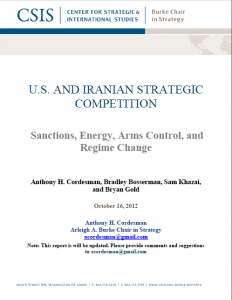Anthony Cordesman: Give Diplomacy Priority While Preserving Security
via Lobe Log
 Anthony Cordesman, a highly respected military and security expert at the Center for Strategic and International Studies (CSIS), writes in a co-authored CSIS report that while the US should be prepared for the worst — an Iranian sprint towards a nuclear weapon — successful negotiations still offer the longest-lasting positive results. Importantly, Cordesman says negotiations can still be successful:
Anthony Cordesman, a highly respected military and security expert at the Center for Strategic and International Studies (CSIS), writes in a co-authored CSIS report that while the US should be prepared for the worst — an Iranian sprint towards a nuclear weapon — successful negotiations still offer the longest-lasting positive results. Importantly, Cordesman says negotiations can still be successful:
Sanctions and diplomacy are the best of a bad (or at least highly uncertain) set of options, but it is far from clear that they will stop Iran’s progress toward a nuclear weapons capability. Despite the lack of diplomatic progress, and the appearance that the Iranians are stalling for time, negotiations can still be successful. Negotiations can bring about long-term change in the US Iranian relationship where military strikes or more sanctions cannot.
The military option, which requires the most resources and carries the most risk, should be the last option:
Preventive attacks might end the chance of successful negotiations for the life of the Islamic
Republic, and usher in a period of containment analogous to the Cold War. Application of this
level of military force might also convince the Iranian regime that nuclear weapons are required
in order to prevent future attacks and will redouble their efforts to produce a weapon. A single
series of military strikes might also only delay Iran for several years, lead it use them as an
excuse to withdraw from the NNPT and IAEA inspection, and use even more resources to surge
towards the deployment of nuclear-armed forces. Such action should only be taken if it becomes
clear that Iran’s regime has reached such ideological extremes where it cannot be deterred or that
there is evidence Iran will produce and quickly use a nuclear weapon.
En Español
The Latest
 From IPS News
From IPS News- Seeking Justice for the Civilian Victims of the Syrian Civil War
- Who Should be the Next UN Leader?PART 7 FINAL
- Will a Two-State Solution include Palestine as a UN Member State?
- UN Live’s CEO Katja Iversen Talks About the Power of Popular Culture and ‘Sounds Right’
- Afghan Women’s Voices Stifled as Taliban Tightens Media Controls
- ‘Toasting the World’s Most Natural Talent’: UN Museum Campaign Recognizes NATURE’s Contributions to Music
- Urgent Global Action Is Essential To Stop Wave of Plastic Pollution
- Making the Global Financial Architecture Work for Emerging Markets and Developing Countries (EMDEs)
- Who Should be the Next UN Leader?PART 6
- The Summit of the Future Is a Rare Chance to Fix a Broken System: Civil Society Must Be Included
- Online fundraising for IPS Inter Press Service at Razoo













